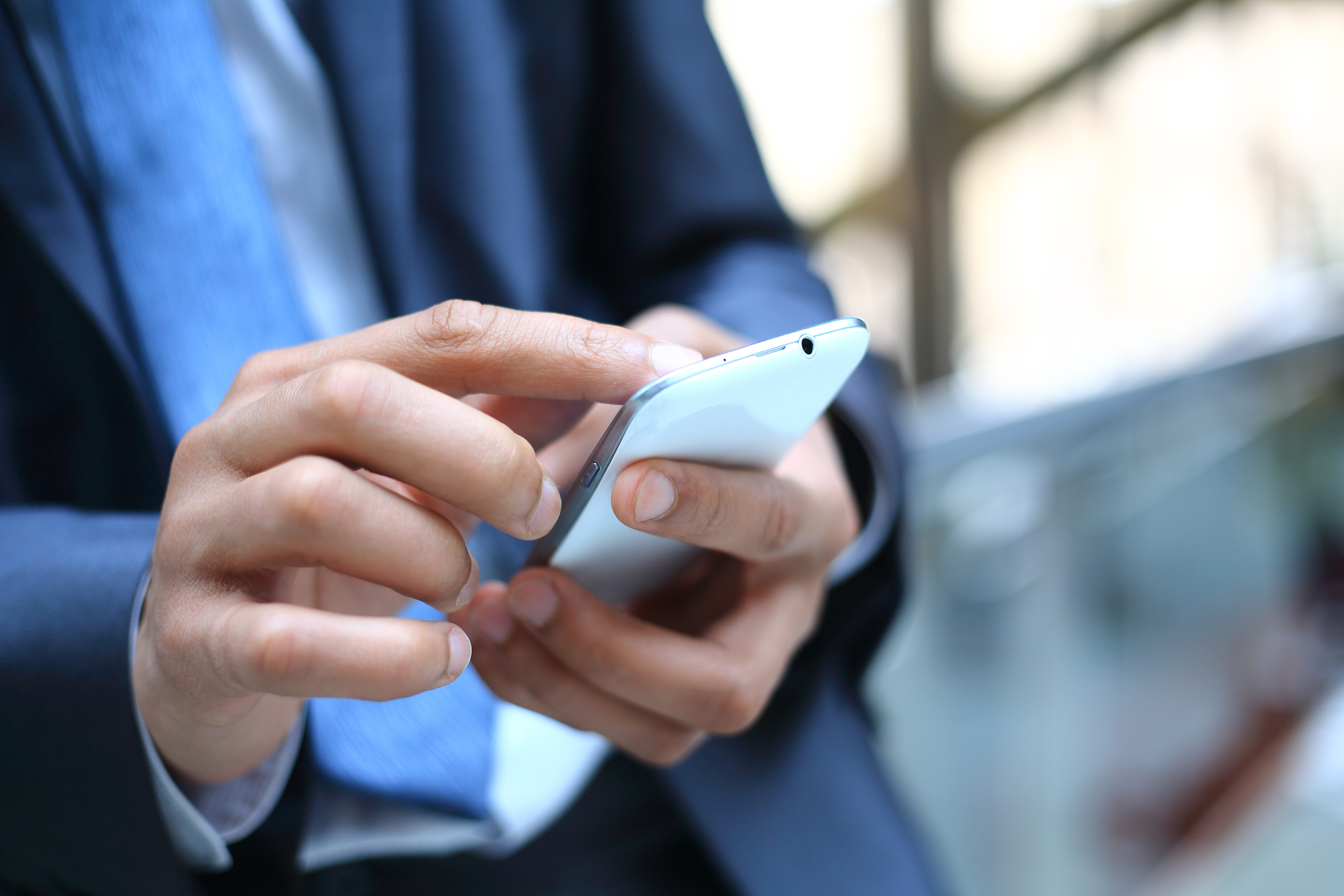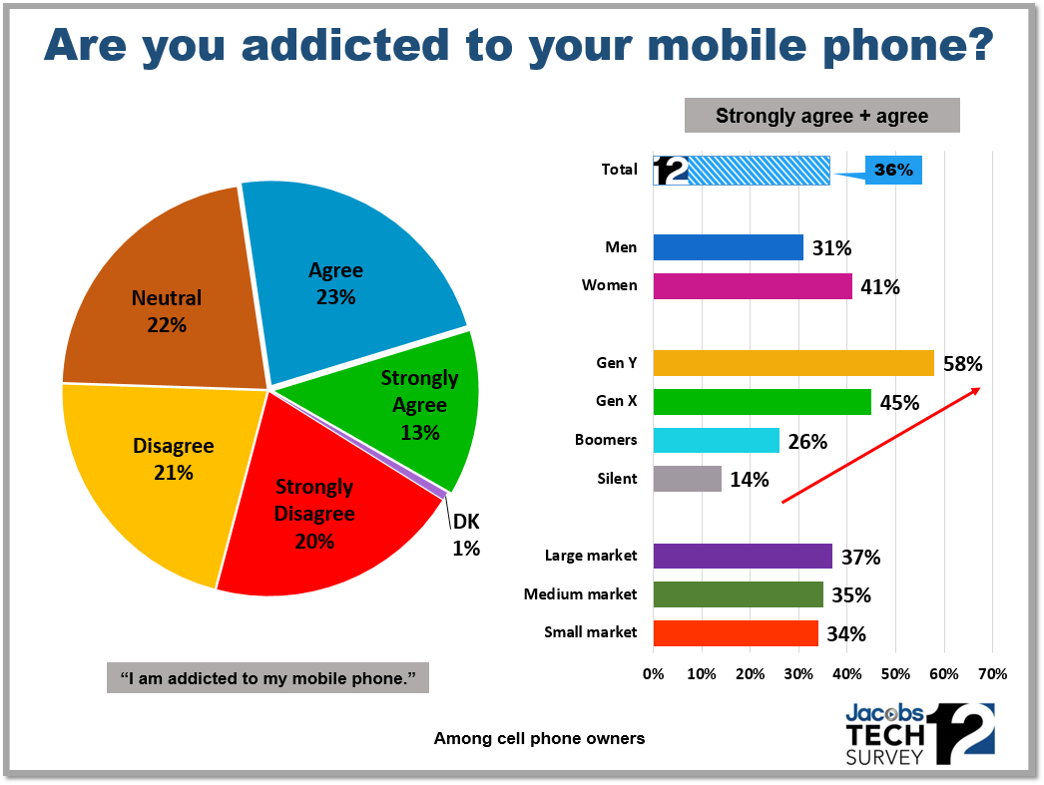This week, some of our posts will touch on our political climate, examining some of the lessons we can learn from the election about media, entertainment, radio, our culture, and ourselves. These posts are not meant to take sides, instigate a firestorm in our “comments” section, or agitate our readers. In the same way educators and historians will analyze and discuss this election for years to come, we already see some important lessons in the political discourse, and hope you read these posts in the spirit in which they were intended. If you choose to comment – and we hope you do – please be sure to keep your observations “above the fray” or they will be deleted. – FJ

The issue of mobile phone addiction becomes more of a societal problem with each passing year. Texting while driving is rooted in our inability to put our iPhones and Galaxy Notes down while we’re behind the wheel.
This is a phenomenon we’ve been tracking for the last few years in our Techsurveys. Each year, the percentage of respondents that admit to being addicted to their phones inches up.
As you can see on the chart below, more than one-third of our more than 39,500 respondents agree or agree strongly they have a dependency on that electronic communicator in their pockets or purses.

When you look deeper at the demographic data, women and progressively younger respondents admit to being addicted to their mobile phones. We may also be seeing a higher degree of dependency among those who live in bigger cities.
I suspect that many of the people who disagreed with our statement – or took the Fifth by responding “neutral” – may not be in touch with the power these devices have over us. It’s noteworthy that nearly six of every ten Millennials in our study came clean about their mobile phone addiction, a sign that perhaps they are more honest about how these devices are increasingly dominating our lives.
And now this issue appears to be having an impact on the Presidential election. For the past several days, the two campaigns as well as scores of media organizations have been reporting on Donald Trump’s early morning tweets about the former Miss Universe. While some pundits are concluding this behavior is attributable to sleep loss or perhaps an obsession with Twitter, the overriding theme points to mobile phone dependency. And in that regard, Mr. Trump is not alone.
Interestingly, The New York Times ran a story exactly one year ago titled “Pithy, Mean and Powerful: How Donald Trump Mastered Twitter for 2016.” Journalist Michael Barbaro noted that Trump uses Twitter “as a tool of political promotion, distraction, score-settling and attack.” Trump bragged in the article that a fan referred to him as “the Ernest Hemingway of 140 characters.”
But like anything we indulge in too often, there’s often a dark side. And that’s something we see when any celebrity – a political candidate, a movie star, a star athlete or a DJ – uses these tools to excess and without boundary. You can master something until such time as it masters you.
Last April in a story in Newsmax, reporter Jason Devaney recounted a Melania Trump appearance on the “Today Show” where she told Savannah Guthrie the one habit she wished her husband would break is “tweeting.”
This doesn’t just happen in politics because we’ve seen repeated evidence that the  proximity and easy access of smartphones combined with the ability to emote on social media can lead to dangerous outcomes – oftentimes the loss of a job and even a career. Oftentimes, brands suffer collateral damage in the process.
proximity and easy access of smartphones combined with the ability to emote on social media can lead to dangerous outcomes – oftentimes the loss of a job and even a career. Oftentimes, brands suffer collateral damage in the process.
On the radio station level, there are many DJs and station staffers whose social media excesses threaten their images, as well as the companies that hire and compensate them. We see supposedly objective journalists at news radio stations posting opinions in social media they would never be able to share on the air. In the process, credibility often suffers.
This drama we see playing out in the Presidential election should be a stark reminder about the magnetic power of both mobile phones and social media. And for radio, the paramount importance of having a sound strategy in both areas to take advantage of how the consumer mindset has been forever altered by a growing dependency on their phones and their social outlets. Yet, too many radio companies invest the bare minimum into both mobile and social initiatives.
At a Techsurvey presentation among radio executives last month, the discussion moved to how many consumers have an AM/FM radio where they live and work. To make the point, I asked the audience comprised of broadcasters whether anyone was carrying an actual radio. Not a single hand went up. But when I held up my iPhone and asked how many in attendance were carrying a mobile phone, the point was made.
We continue to see signs – both positive and negative – about the impact mobile and often by extension, social, is having on our lives, our careers, and our relationships. Radio owners and managers need to harness these tools but also understand how they can have powerful impacts on brands, reputations, and of course, revenue.
We are well past the point where a mediocre mobile app or a poorly maintained Facebook page will satisfy the needs of an audience that relies on both to conduct their lives.
And as it applies to the addictive quality of these modern-day conveniences and communications tools, Trump made this Twitter campaign promise at one of his rallies:
“Don’t worry. I’ll give it up after I’m president. We won’t tweet anymore. I don’t know. It’s not presidential.”
If you’ve ever known an addict, you’ve no doubt heard that line before.
- What Is It With Female Robot DJs? - April 30, 2025
- Why “Dance With Those Who Brung You” Should Be Radio’s Operating Philosophy In 2025 - April 29, 2025
- The Exponential Value of Nurturing Radio Superfans - April 28, 2025




Leave a Reply